CTNow.com
Few bands get to enjoy a first act, let alone a second one. Somewhere near the post-"Sgt. Pepper" intersection of psychedelic and progressive rock, U.K.'s Moody Blues crafted memorable album-length statements like "Days of Future Past" (1967), "In Search of the Lost Chord" (1968) and "On the Threshold of a Dream" (1969), while cracking the charts with "Nights in White Satin," a pocket symphony that still sounds futuristic.
But like a lot of 1960s bands, the Moodys struggled in the early 1980s. Producer Tony Visconti, who had already worked with Wings and David Bowie among others, was brought on board for 1986's "The Other Side of Life," their Polydor Records debut, and it worked; the album was a surprise smash, scoring two hits with "Your Wildest Dreams" and the sequencer-heavy title track. A couple of catchy videos later, the Moodys had recaptured their fans while reeling in a younger, MTV-primed crowd. Those crucial Polydor years are the focus of the current Moody Blues tour, which brings them to the Toyota Oakdale Theatre in Wallingford on Sunday, March 22.
CTNow spoke with singer and guitarist Justin Hayward about the band's struggle to rebuild in the '80s as well as the legacy of the Moody's earlier prog-rock epics.
CTNow: The current tour celebrates the Polydor years in the mid-1980s. What can you tell me about that time?
Justin Hayward: Of course, it was wonderful to have success the second time around in your life like that, and to have such big success with a couple of really big hit singles. There's no doubt, from where I was standing, that we were in decline in about 1983. Ticket sales had really gone down. There was nothing really fresh in the band. The music business was moving so fast. It was very transient.
One day, I had the good fortune to meet Tony Visconti, who I knew vaguely as a producer. We got together and did something for the BBC, and we hit it off so well that I persuaded the other guys that he would be the right producer for the band. The first thing we did with the band was "The Other Side of Life," and it gave us a huge record. The sound of the record, I think, just changed everything, and the way the people saw the group was in the sound. Suddenly we weren't a dated '60s and '70s band anymore. Sonically, the group had come right up to date. It was a wonderful time for us. I think a lot of people who came to the band in that period, around 1985 to 1987, are the people who are still with us today. That's the core audience for us. With "Your Wildest Dreams" and "The Other Side of Life," our audience grew immensely. We got back into big venues and selling out places, and we haven't looked back since.
CTNow: What was it about Visconti's approach that made the band sound so good?
JH: He was one of the first people who understood programming. I was doing things on MIDI in my own music room, and I was able to bring my own demos into the studio. Instead of remaking them from scratch with the group, I was able to use them as the basis for the songs, because I had time codes on them and everything. He was a keyboard player and a bass player, and he could see the value in keeping the spark and the original magic of any of our demos of any of our songs and including them in the final recordings. It was magic. He worked very, very quickly. The album before, which was called "The Present," there was one song on it that took 13 weeks to record. With a lot of cocaine going down, or whatever, it was just insane. We needed a big shake-up. Tony worked from 11 in the morning until 7 at night, and that was it, and it was intense. At five past seven, he'd be out the door, and you'd be thinking, "I'm actually exhausted, but I've had a great day."
That's what he brought to the band. He was like a time-and-motion-study bloke of the perfect order. He was a legend. He would come in at 10 a.m. every morning to meet people who'd made the pilgrimage to come and meet him, obviously because of the work he'd done with David Bowie and Marc Bolan. He had a lot of young fans of his own who'd make the pilgrimage to come and see him. I'm pleased to still be very close to him today.
CTNow: Looking back even further: the Moody Blues worked with orchestras and made gestures toward classical music. Does the band get credit for those innovations?
JH: I'll leave that one alone. I don't have any feelings about it, and I don't have any regrets about it, because getting credit for something is not what I really yearn for. The fact is that we've gotten to the age we're at and we can still sell out venues. I'm very lucky to have a great solo career and a great label for my solo stuff. I'm not really worried about that. But I'm very grateful that, after all these years, I'm still there and able to do it, and to have a choice of what to do with my own solo acoustic show and the big productions of the Moodys. It's absolutely wonderful.
CTNow: Rock musicians in the late 1960s were suddenly doing things that were previously unheard of. What gave you that license, that feeling that you could take rock music a little more seriously?
JH: The most valuable commodity — still — in the music business is youth, and we had that on our side. We had a generation that we could rebel against, the one that was immediately before us, so that was hugely convenient. Also, it was the perfect combination of the days of the record companies having big recording studios with fantastic technicians and engineers. We found ourselves like the Beatles with EMI and Abbey Road with a label. After "Days of Future Past," our first record, there was a whole series of accidents. Nobody can claim that it was planned or anything like that. It just worked out that way. But it caught the imagination.
Decca, our record company, had these wonderful recording studios, mostly to do with classical music and middle-of-the-road artists. But literally, the chairman of Decca, Sir Edward Lewis, who was a lovely man, did come and see us, and he said, "I don't know what you're doing, but people really love it, so just get on with it. Here's the studio. Just do what you want. You can have lunch, dinner and tea in there. It's yours all day long." For us, it was like being kids in a toy shop. It was wonderful for us. I think a lot of groups in the 1960s who were given that great gift — the Beatles, of course, were like that, and the Kinks — had these wonderful places available to them, and it gave you time and space to think about creative kinds of things. And of course, the album was becoming the format that people really loved.
CTNow: Was there a sense that you had a bigger canvas — the album — to express your ideas?
JH: It was certainly the turning point of people buying stereo systems, and albums became the thing to record. I feel for artists nowadays. I'm guilty of it myself, just buying singles again, like I did when I was a kid, listening to Buddy Holly or the Everlys or something, and not really giving enough attention to people's albums, or buying them as a unit. We tend to buy singles again now, don't we? A lot of times we don't even know who they're by. We just Google the first line, or something, that we like, and we buy it. But the 1960s and '70s — and we were lucky to be in the forefront of that — was the time when people were interested in albums. You'd go around to somebody's house or apartment and you'd play the whole album. It was a great time, and we were very lucky to be a part of it.
CTNow: The upcoming tour: you're going all the way through June, and you're going to be in both the U.S. and the U.K. You've mentioned in interviews that U.S. audiences tend to be louder. Is that true?
JH: Yes, I think that's a cultural thing, which is very nice. You're a member of the greatest nation on Earth: speak up! I'm doing a solo tour in the summer, just me and my guitar player Mike Dawes, who's a fabulous player, and I'm a little bit worried to be in Europe and the U.K. I know how quiet they are. You can hear a pin drop. But it's always refreshing; America is the land of our heroes. It's the home of rock and roll music, and I think people are used to going to concerts and experiencing that energy in the U.S., and that's a wonderful thing to share.

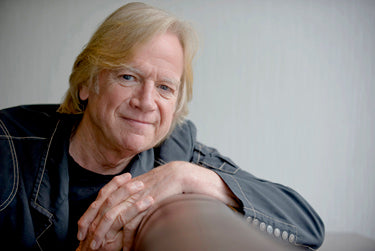 Justin Hayward spoke with Alan Thompson on BBC Radio Wales which originally was broadcast on March 15th.
Alan explores Justin Hayward's new album and celebrates the seventieth birthday of guitarist Eric Clapton.
Justin's segment begins at about 21:38.
Justin Hayward spoke with Alan Thompson on BBC Radio Wales which originally was broadcast on March 15th.
Alan explores Justin Hayward's new album and celebrates the seventieth birthday of guitarist Eric Clapton.
Justin's segment begins at about 21:38.
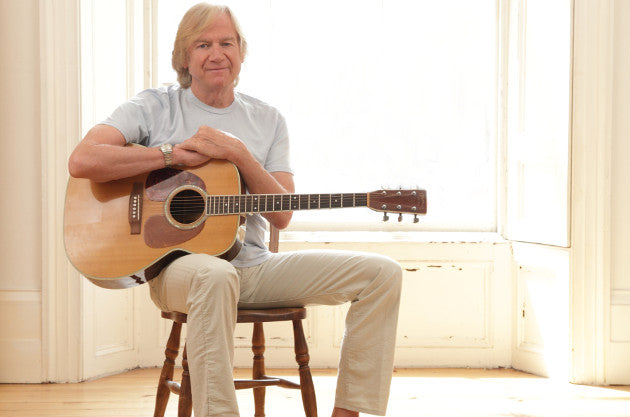 Music legends don’t come along every day, so I am always thrilled when one decides to take a moment to share his or her journey with me. But when
Music legends don’t come along every day, so I am always thrilled when one decides to take a moment to share his or her journey with me. But when 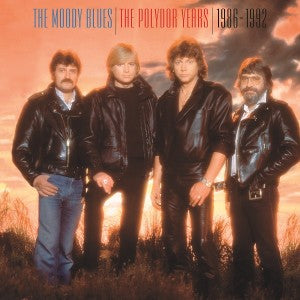 The Moody Blues - The Polydor Years
The Moody Blues - The Polydor Years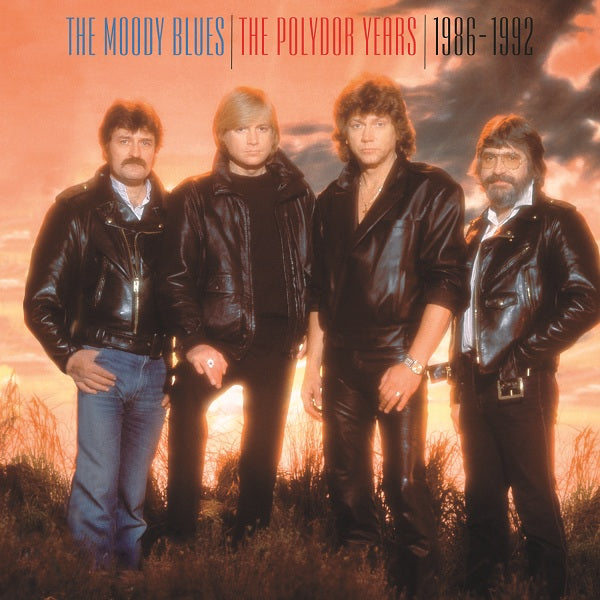 Due for release on November 24, the superbly packaged eight disc (six CDs and two DVDs) set brings together, for the first time, remastered editions of all The Moody Blues’ Polydor era albums, spanning the period 1986-1992. The package -
Due for release on November 24, the superbly packaged eight disc (six CDs and two DVDs) set brings together, for the first time, remastered editions of all The Moody Blues’ Polydor era albums, spanning the period 1986-1992. The package - 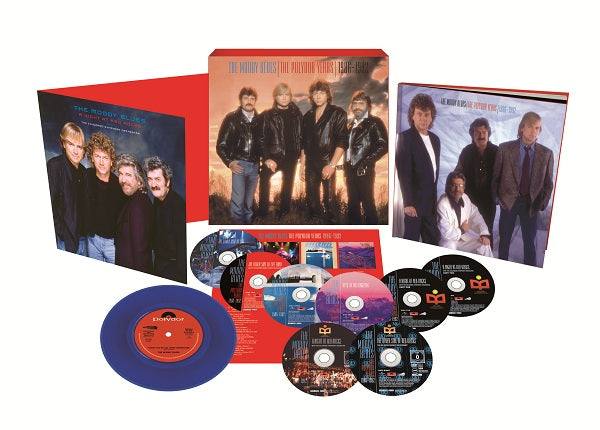 Pre-Order Your Copy Today from the Official Moody Blues Online Store.
Pre-Order Your Copy Today from the Official Moody Blues Online Store.
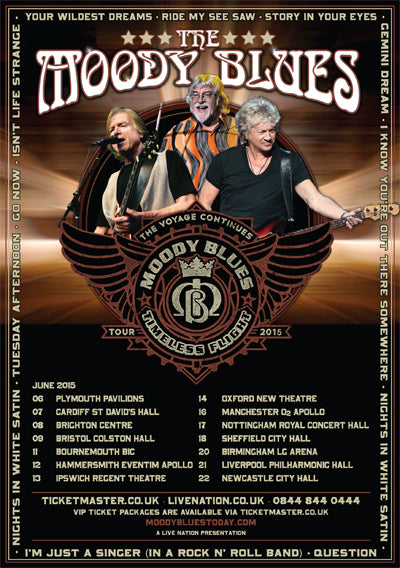 Live Nation is delighted to announce the ‘Timeless Flight 2015’ Tour from The Moody Blues, one of the most enduring, creative and consistent groups in the world. Tickets go on sale on 19 September 2014 from
Live Nation is delighted to announce the ‘Timeless Flight 2015’ Tour from The Moody Blues, one of the most enduring, creative and consistent groups in the world. Tickets go on sale on 19 September 2014 from 
